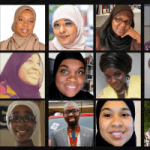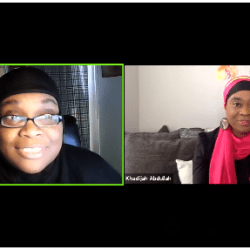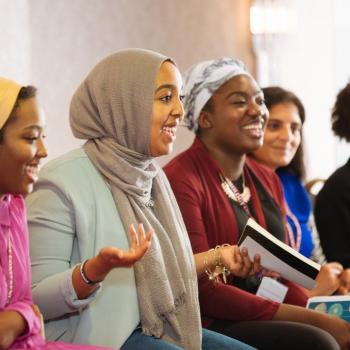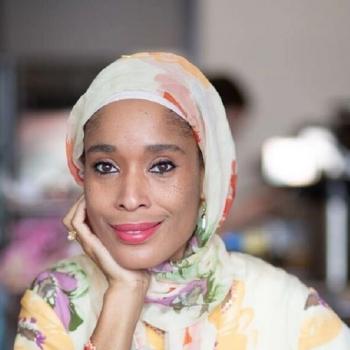 Review by Layla Abdullah-Poulos
Review by Layla Abdullah-Poulos
I-INTIMACY
By Ismail Shaikh
$9.97, pp. 181, Kindle
Something I’ve observed exploring my and various Muslim cultures is a strong need to bridge chasms between traditional Islamic scholarship and more socially-centered professional disciplines. Too often, Muslims rely solely on the opinion of scholars whose depth and breadth of knowledge is restricted to the faith without much proficiency in areas needed to offer productive advice for Muslims navigating personal, interpersonal and social issues.
People frequently approach imams and shaikhs with a litany of problems that Islamic experts are frankly not equipped to handle, regularly ignoring the pool of experts in communities with skillsets to assist, advocate and advise. When said experts infuse Islamic concepts, it creates an opportunity to benefit from faith-enhanced help.
I was very interested in reading I-Intimacy: A Revolutionary Guide on Using Mawaddah and Rahma to Drastically Boost Emotional Intimacy in Your family by Ismail Shaikh. Based upon the description given, it seemed like clinical social worker and founder of online counseling services Carekhalifah Inc would be offering a blended-faith approach to issues surrounding familial intimacy.
The image of two wedding rings (not an Islamic cultural staple) on the cover alludes to the book focusing on marital intimacy, which it mostly does, but there are other aspects of intimacy mixed into the texts. Shaikh uses an anecdotal style to connect with readers and lay out some of his advice on mainly emotional intimacy and communication. His casual conveyance of advice, developed through his practice, is meant to encourage more positive familial interactions (mostly between spouses) to foster loving and nurturing environments.
Organization and Depth
I like the overall premise of I-Intimacy and applaud Shaikh’s desire to offer some pearls of expert wisdom through a popular cultural vehicle. Self-help books abound, and Muslims globally need more that center and respect their faith as a Deen (way of life) and tantamount to how many of them navigate their lives. However, I found a few challenges with fully embracing all of the concepts the author addresses.
For me, Shaikh’s advice, though ultimately poignant, needed a little more organization and depth. Most of the tone of the book feels like he’s talking about his experience as a husband and clinician, which I liked, but it left a lot to be desired at the points where he offered actual advice. It would have been great if the author spent a little more time on organizing his experiences and counsel in each chapter, drawing more evident parallels and cause and effect between the two (this is what happened and because of that I drew this conclusion).
Deeper exploration by Shaikh would’ve also been a plus, perhaps really just committing to concentrating on emotional intimacy at the marital level instead purporting a catchall, which the book is not—and who really wants one?
The author also writes about complex issues somewhat simplistically. For example, I think in an attempt to specify the type of intimacy his book addresses, Shaikh oversimplifies the intricate relationship between sexual and emotional intimacy. Given predominant dysfunctions regarding both in Muslim cultures, there is no room to “skim” such an important dynamic.
The author vacillates too much between spousal and familial interactions, so gleaning and appreciating the wisdom he offered became a bit of a chore, and by the time I was able to really connect as a reader to his profound perspectives, he’d move onto something else, giving I-Intimacy the tone that it is one of those “write a book in 30-days” to become a published author projects.
If it weren’t for Shaikh’s affable narration, I would dismiss it as such, but what he does have regarding social gems prevents me from doing so outright. He presents as a personable clinician with an impressive body of knowledge and experience. I just wished he’d demonstrated more of it by narrowing the topics in I-Intimacy and outlining them from his cultural perspective.
Cultural Erasure
There are some cultural generalizations in I-Intimacy, which I found challenging in fully embracing some of the concepts the book contained. Shaikh makes a broad-brush assertion by framing Western culture as “individual-centric,” wherein its members undervalue the family and community, which demonstrates an underappreciation of the diverse races, ethnicities and faiths contained therein, including Muslim culture. There are millions of native-born Muslims in “the West.” In the US alone, there are native-born American Muslims who are part of and promote family/community-centric subcultures, including African Americans, Native Americans, Latinx Americans and European Americans. Shaikh erroneously sets up a “clash of civilizations” frame, which makes apparent that I-Intimacy is for readers from certain Muslim backgrounds, primarily South Asian.
Shaikh further implies that his intended audience is for Muslims sharing specific social experiences through his descriptions of familial worldviews and lives. He writes, “If our children don’t become doctors, lawyers, or engineers, we become upset. Yet it is okay for us if they neglect their prayers and religion in the process.” He also addresses the mistreatment of daughter-in-laws, both of which are not necessarily issues in Muslim cultures globally. It’s perfectly fine if Shaikh wants to explain and advise upon culturally-specific matters, but he should be more explicit that I-Intimacy is more about South Asian emotional intimacy and not Muslims in general. By doing so, he avoids some significant cultural erasure and reinforcing stereotypes.
Gender Issues
As with most text written by Muslim men, I-Intimacy contains some problematic gender assertions. After reading the beginning of the book, I was so hopeful that Shaikh would be a rarity—a Muslim male expert speaking instead of dictating to Muslim women about how they should navigating their marital and familial relationships. Unfortunately, that was not the case.
Shaikh falls into the typical phallic dictatorial instruction to Muslim women how to be “happy” Muslim women and wives without actually being one. Muslim cultures historically and globally afford Muslim men the delusional privilege that they are the pedagogues of femininity and they must tell Muslim women who they are and how they should behave. Reading how Shaikh derides women choosing not to address their in-laws as “mom” or “dad” as “shallow thinking” and “the closing of hearts,” I cringed. It negated some of the great statements he made just the chapter because he establishes a simultaneous defense and derision of women from a position of male supremacy and infuses prevalent masculine condescension.
Such mixed messaging occurs in most works about Muslim women; it is both symbolically violent and spiritually deflating, and I long for reading something from Muslim men that are free from it. The dualistic gender contentions in I-Intimacy make it difficult to discern where Shaikh sits on the spectrum of misogyny, chauvinism and patronization common among Muslim male scholars, academics and experts. I am hopeful that he may read this review and consider how it is he can improve his approach.
Muslim men must recognize that Muslim women are plenty smart and autonomous enough to engage in critical conversations about their Muslimness and womanhood. Being male doesn’t ordain one to develop or dictate such discussions, and a shift to a place of respect and observation is essential.
Final Impression
It may seem like I didn’t like I-Intimacy. I actually did, but would have more so without all of the heavy lifting and sifting. South Asians will probably not have as many tensions, and people outside that culture can still benefit despite the cultural limitations.
As a first book, Shaikh did a decent job; he just seemed enthusiastic about including more than necessary, which is not unusual for first-time writers.
With more focus, organization and depth, I anticipate Ismail Shaikh’s future books—yeah, he totally needs to keep writing—will be increasingly productive and empowering.













